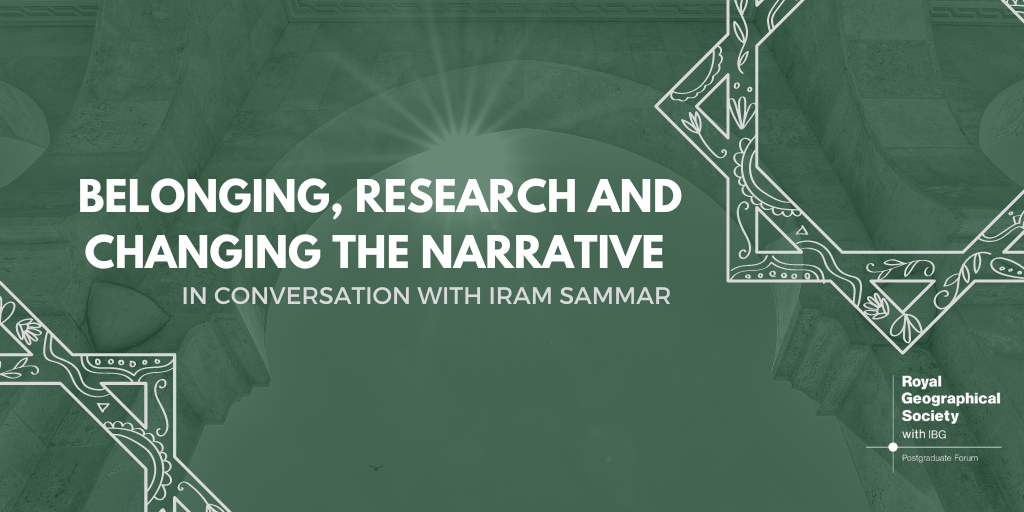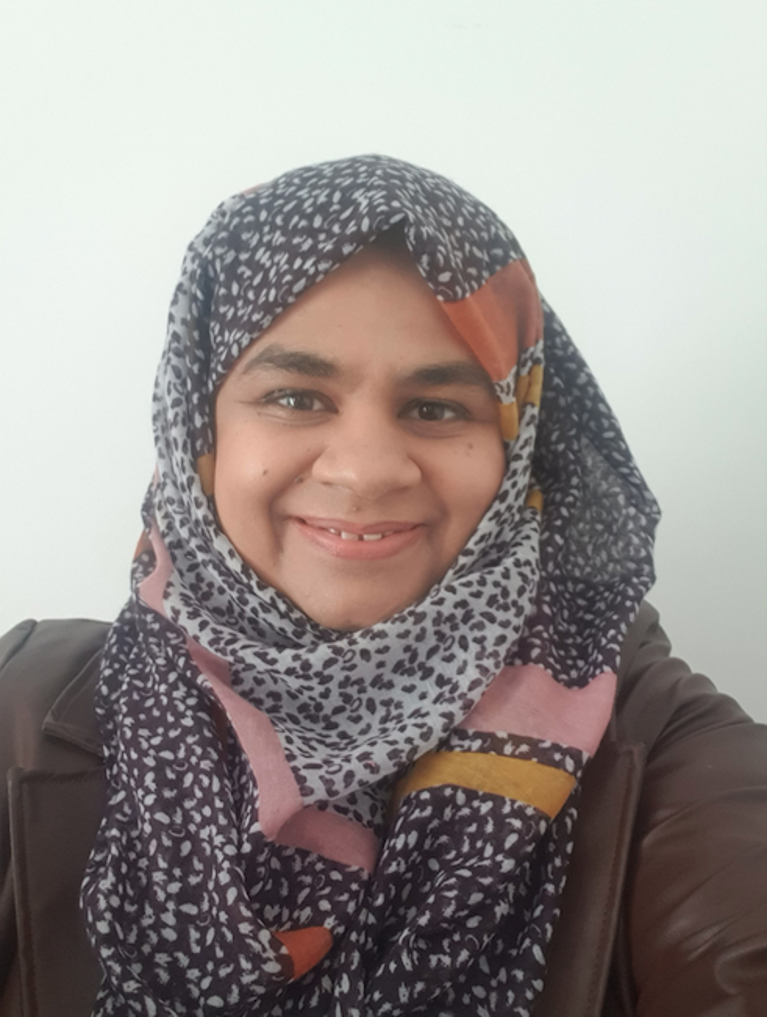
Iram Sammar is a PhD Student at IOE, UCL’s Faculty of Education and Society – she is researching anti-racism and decoloniality in school Geography education in England, which will take an autoethnographic methodological approach. Iram is an experienced Geography school teacher and has taught in a range of secondary schools after completing her PGCE in 2007 at IOE – the experience her research now draws upon. Iram is the founder of Salaam Geographia, meaning ’peace to geography’, a platform and consultancy (under SG Consultancy) celebrating the everyday geographies that young learners should experience and learn about regardless of race and ethnicity in the new century. She was awarded the Ordnance Survey Award from the Royal Geographical Society with the Institute of British Geographers this year.

My story is embedded in numerous stories, of a Muslim teacher and her quest to find her place in the Western European country she was born in, the United Kingdom. In my pedagogical approach to teaching geography, presentations and writings, I enjoy telling stories through comical and sometimes serious anecdotal narratives from the classroom or everyday life experiences. I created Salaam Geographia, a blog and consultancy, to capture some of these stories and experiences, so educators can engage fully with the underrepresented communities they serve, whether through teaching or sharing ideas and resources. Through my work, I try to ease tensions, as it helps me navigate the simple question of, who am I?
Being racialised in different categories from Indo/Pak, British Asian to Black Asian Minority Ethnic is a reality I have grown up with. Beyond being an academic geographer or teacher, I am a Muslim living in Britain with a deep love for my South Asian heritage rooted in Pakistan. Since childhood, I have enjoyed answering the question ‘where are you from?’, as I have an unapologetic response, ‘Pakistani’. Is this not the answer, the questioners of such a question are in search of? The notion that you can not be just British, you must be linked to another place, is one to note. It could be because of my brown skin complexion; or perhaps the reality of my actions when I seek out a room to offer salah (Islamic prayer) at work during lunch break; or it could be the cloth I chose to wear to cover my hair with; or something else that deems me ‘different’, the ‘other’ to the gaze that is upon me. As a South Asian, I welcome any knowledge that takes me beyond Eurocentrism or the dominant white narrative that I have become accustomed to, by default, throughout my educational journey in England.
Geography has been more than a discipline in my educational career, it has been an organic horizon for me which shed light on my life. I chose to study geography, as I was very keen to understand my cultural heritage, my faith and spirituality, the country my parents were born in, Pakistan – with all its colonial and empire past – my existence. Pakistan, is it a birth of a state beyond the shackles of colonialism and oppression, or a partition enforced by British imperialism and rule? As a secondary school geography teacher, I was always keen to critique how the global south case studies were represented in the textbooks – with students and colleagues. I chose to be culturally appropriate in my approach to pedagogy, as I would highlight the misrepresentations and stereotyping; lack of depth on the sense of place; and historical colonial impacts of British Empire. I began to value decolonial thought, so students particularly who looked like me (from the global majority heritages) could feel a part of the whole geography learning and explore their own geographies through their individual perspectives. It was a tough, yet rewarding task, however not one that is easily accomplished in one or two token lessons. Certainly not a dedicated week, month, or day. For this reason, I took time out of teaching to begin my Ph.D. My own knowledge was stagnant, so I decided to explore anti-racism, racial capitalism and decoloniality to make sense of some uncomfortable feelings I experienced in the classroom. Some of the case studies, perspectives and concepts taught in school geography were in desperate need of rethinking.
As a secondary school student, I would have welcomed a positive case study on Pakistan and other Muslim-majority places. Instead, I would be presented with the typical ‘developing’ or ‘othering’ representation, which made me feel upset and disengaged. Things have not changed much. Many students from Muslim communities, who I have taught or spoken to choose not to take geography at A Level, due to the dearth of representation of their heritages. There are other reasons, however a lack of representation should not be a barrier to exploring or pursuing a career in geography. As I ponder on what has happened in my own classrooms, I know the kind of changes I would like to see. It would be great to introduce learning that places the student at the heart of the curriculum, where they feel represented and valued. For example, the physical and environmental geography of Pakistan is stunning in places such as the northern mountains of Murree or Swat Valley; Imran Khan’s inspirational tree planting project; or the pink salt mines of Khewra and the battle against colonial extractive histories attached – all would make great learning. Often, students I have taught have told me they feel embarrassed about ‘the single story, or misinformation about their religion or country of heritage – including those found in the media and school curriculum. I really would like to see a more accurate representation of children from ethnic minority heritages. More recently I have been investigating the geographies of Africa and how the countries within have been homogenised, again a single story told repeatedly. When will the narrative change?



I now live in the city of London and have worked as a geography teacher in a range of secondary schools – including experience of faith and mixed comprehensive. Looking back, I feel so grateful that I chose A Level geography, although many people around me could not see the benefits as I did. Thinking about how my identity, racism and cultural differences used to make me feel isolated and detached, gives me a sense of relief that I can now contextualise this for others. Studying geography at university has empowered me and opened my eyes to the complexities of the world, with all the intersectional connections, processes and imaginations it comes with. For my Independent Research during undergraduate studies, I explored the life experiences of first and second generation of South Asian women in Oxford. It was inspired by the postcolonial realities both my parents faced before they migrated from Pakistan to live in the UK during the 1970s. My mother has inspired me the most – her stories, life, teachings, struggles and achievements have shaped and nurtured my geographical senses. It seems like a long-distance move for me, however it was one made before my birth and certainly not an easy one for both my parents. I cherish their knowledge and experiences, as they both faced many struggles such as racial tensions of the 1980s and the austerity in raising a family with limited resources.
I am still in search of the question, where do I belong? As my plural identity takes me to my South Asian roots and beyond. This question finds its way into the classroom, where I exercise discussions of colonialism, racism and migration to contextualise who I am and why I am here. When I meet a class for the first time, I talk to the students through general ideas about colonialism, different world perspectives and understanding diversity and community cohesion. My educational philosophy is to teach historical geography embedded in anti-racist praxis through a decolonial lens, before approaching a case study. Future learners need to have that historical (and) geographical context especially as it may be the only time they get to think critically about the world and their place in it. With geography, I have been able to challenge the complexities of identity construction and explore the possibility of belonging somewhere, somehow. My gratitude to Allah ﷻ (Arabic for God) for guiding me to a subject such as geography, it cannot go unsaid – if nowhere else, I belong on Earth.
You can follow Iram @IramSammar, Salaam Geographia @GeographySalaam and read Iram’s writing on salaamgeographia.com including this piece Bus Ride Home: “Go back to where you came from!”